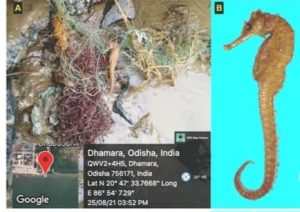Rare Seahorse species found in ghost net at Dhamra

Bhubaneswar: In a worrying sign of escalating marine pollution, scientists have reported the first-ever sighting of a rare and vulnerable seahorse species, ‘Hippocampus kelloggi’, ensnared in a ghost net at Dhamra estuary. The discovery has sparked concerns about the unchecked dumping of abandoned fishing gear in waters and its devastating impact on marine biodiversity.
The rare specimen was found during routine ecological monitoring by a team of researchers, led by marine biologist Debashish Mahapatra, along with Sangita Mishra, Sarada S Pati, and other collaborators.
The findings, recently published in the National Academy Science Letters, document the presence of the ‘Kellogg’s’ seahorse — a species classified as ‘Vulnerable’ by the International Union for Conservation of Nature (IUCN).
“This is a major red flag,” said Mahapatra. “Finding a ‘Hippocampus Kelloggi’ in a ghost net highlights not only the richness of biodiversity in the Dhamra region but also how seriously it is being threatened by human activities,” he added.
Ghost nets —known as ALDFG (Abandoned, Lost or Discarded Fishing Gear) — are one of the most lethal forms of marine pollution. Globally, over 640,000 tonne of such gear are lost to the oceans every year, posing grave threats to marine life.
These nets continue to trap and kill marine organisms long after they have been discarded, earning them the name ‘ghost’ nets.
Seahorses are especially vulnerable, both due to their delicate physiology and the high demand for them in traditional medicine, ornamental trade, and the aquarium industry. Despite legal protections, illegal capture and trade persist in several parts of the world, including regions within the Indo-Pacific — a global hotspot for seahorse diversity.
The study emphasises that such incidents go beyond ecological concerns and have potential socio-economic consequences. “Fishing communities depend on healthy marine ecosystems. The continued presence of ghost nets could severely disrupt local livelihoods,” Mahapatra added.
The research team is calling for immediate policy interventions, including the removal and regulation of ghost nets, promotion of sustainable fishing practices, and strengthened marine conservation frameworks.
“This case is not just about one seahorse,” said co-author Mishra. “It’s a warning about the broader ecological collapse that may follow if marine pollution is not addressed urgently,” he added.
The findings are expected to fuel ongoing policy discussions around India’s coastal and marine biodiversity conservation, with experts urging the government and environmental bodies to act swiftly before more damage is done.
News